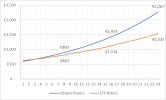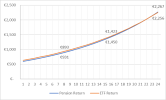@Ent319
If I understand your last post correctly, I think your point is that pensions are better than any other vehicle for growing wealth due to the fact that investments can grow almost indefinitely without triggering a tax event. You are saying that the marginal tax rate is not that important if your plan is to grow your pension all throughout your retirement.
You also argue that even contributions at 20% tax relief and taxed at 52% on drawdown are worth it if they have 50-60 years of potential growth.
The obvious counterpoint to this is the 4% / 5% imputed distributions but your argument on this point is that pension investments may well achieve returns higher than this amount and therefore your pension could continue to grow if the actual withdrawals are kept close to the imputed distributions.
Have I understood you correctly?
Based on the above, I presume that you expect to need to only make modest drawdowns from your pension when you retire and your goal is not about running your pension down to zero at the end of your life but it is more about maximising what you can pass on. If this is the case, then your investment horizon is probably very long (depending on your age and health) and a pension is definitely better than ETFs or shares in my opinion for that purpose.
And I agree that as the investment term gets longer, the tax relief on contributions is less and less important. According my very quick calculations, even at 20% tax relief, pensions overtake ETFs in terms of performance after ~14 years (assuming 45% marginal tax rate). Even pensions at 0% tax relief overtake ETFs eventually (~25 years).
My circumstances are different however. I aim to spend my pension entirely during my retirement and in fact I hope to retire early in order to achieve this. So I will drawdown and pay tax on all of my pension, hopefully. The main question I have is whether my current level of pension contributions make sense given that I could be in the 52% tax bracket for part of my income in retirement. And as I explained in my earlier post, I think it does make sense for me, and indeed for most other people also in most circumstances.
I have faced a dilemma which reminds me a little of your scenario. I could plan to drawdown less in the early years of my retirement and this would allow the investments in my pension to grow more - a lot more. For example. I was to take 5k less /yr in the first half of my retirement, I expect that I could afford to take 20k more /yr in the 2nd half. But I think more income when I am younger will be more useful.

